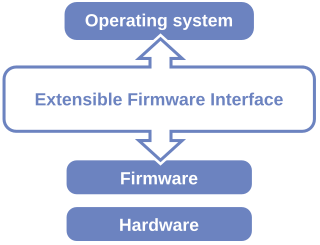Related Research Articles

The Unified Extensible Firmware Interface (UEFI) is a publicly available specification that defines a software interface between an operating system and platform firmware. UEFI replaces the legacy Basic Input/Output System (BIOS) firmware interface originally present in all IBM PC-compatible personal computers, with most UEFI firmware implementations providing support for legacy BIOS services. UEFI can support remote diagnostics and repair of computers, even with no operating system installed.
Wind River Systems, also known as Wind River, is an Alameda, California–based wholly owned subsidiary of TPG Capital. The company develops embedded system and cloud software consisting of real-time operating systems software, industry-specific software, simulation technology, development tools and middleware.
Operating systems based on the Linux kernel are used in embedded systems such as consumer electronics.

OpenEmbedded is a build automation framework and cross-compile environment used to create Linux distributions for embedded devices. The OpenEmbedded framework is developed by the OpenEmbedded community, which was formally established in 2003. OpenEmbedded is the recommended build system of the Yocto Project, which is a Linux Foundation workgroup that assists commercial companies in the development of Linux-based systems for embedded products.

Linux is a family of open-source Unix-like operating systems based on the Linux kernel, an operating system kernel first released on September 17, 1991, by Linus Torvalds. Linux is typically packaged in a Linux distribution.
The Ångström distribution is a defunct Linux distribution for a variety of embedded devices. The distribution is the result of work by developers from the OpenZaurus, OpenEmbedded, and OpenSIMpad projects. The graphical user interfaces (GUIs) available are OPIE and GPE among other options.
Moorestown is the Intel Corporation's handheld MID and smartphone platform based on Lincroft system-on-a-chip with an Atom processor core, Langwell input/output Platform Controller Hub, and a Briertown Power Management IC. Announced in 2010, the platform was demonstrated running Moblin Linux.
Video Acceleration API (VA-API) is an open source application programming interface that allows applications such as VLC media player or GStreamer to use hardware video acceleration capabilities, usually provided by the graphics processing unit (GPU). It is implemented by the free and open-source library libva, combined with a hardware-specific driver, usually provided together with the GPU driver.
Olivier Fourdan is the creator of the Xfce desktop environment, for which development began at the end of 1996.

Moblin, short for 'mobile Linux', is a discontinued open source operating system and application stack for Mobile Internet Devices (MIDs), netbooks, nettops and embedded devices.

Ubuntu Netbook Edition (UNE), known as Ubuntu Netbook Remix (UNR) prior to the release of Ubuntu 10.04, is a discontinued version of the Ubuntu operating system (OS) that had been optimized to enable it to work better on netbooks and other devices with small screens or with the Intel Atom CPU.
Netbooks are small laptops, with screen sizes between approximately 7 and 12 inches and low power consumption. They use either an SSD or a HDD for storage, have up to 2 gigabytes of RAM, lack an optical disk drive, and usually have USB, Ethernet, WiFi and often Bluetooth connectivity. The name emphasizes their use as portable Internet appliances.

MeeGo is a discontinued Linux distribution hosted by the Linux Foundation, using source code from the operating systems Moblin and Maemo. Primarily targeted at mobile devices and information appliances in the consumer electronics market, MeeGo was designed to act as an operating system for hardware platforms such as netbooks, entry-level desktops, nettops, tablet computers, mobile computing and communications devices, in-vehicle infotainment devices, SmartTV / ConnectedTV, IPTV-boxes, smart phones, and other embedded systems.

Tizen is a Linux-based mobile operating system backed by the Linux Foundation, mainly developed and used primarily by Samsung Electronics.

The Yocto Project is a Linux Foundation collaborative open source project whose goal is to produce tools and processes that enable the creation of Linux distributions for embedded and IoT software that are independent of the underlying architecture of the embedded hardware. The project was announced by the Linux Foundation in 2010 and launched in March, 2011, in collaboration with 22 organizations, including OpenEmbedded.
OpenELEC was a Linux distribution designed for home theater PCs and based on the Kodi media player.

Intel Galileo is the first in a line of Arduino-certified development boards based on Intel x86 architecture and is designed for the maker and education communities. Intel released two versions of Galileo, referred to as Gen 1 and Gen 2. These development boards are sometimes called "Breakout boards".
ConnMan is an internet connection manager for embedded devices running the Linux operating system.

Clear Linux OS is a Linux distribution, developed and maintained on Intel's 01.org open-source platform, and optimized for Intel's microprocessors with an emphasis on performance and security. Its optimizations also affect AMD-systems. Clear Linux OS follows a rolling release model. Clear Linux OS is not intended to be a general-purpose Linux distribution; it is designed to be used by IT professionals for DevOps, AI application development, cloud computing, and containers. It currently is the fastest available Linux implementation.